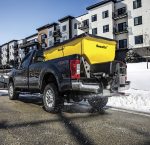Managing a fleet isn’t the easiest job, no matter the size of your fleet. After all, our whole magazine is dedicated to solving common issues faced by fleet owners and managers on a daily basis.
Although there are many issues fleet managers have in common, several issues fall under three categories: maintenance, money, and driver and customer satisfaction. These issues often overlap and affect each other. It’s important to ensure these aspects are well taken care of to avoid a domino effect that could ruin your operations.
One way to monitor these issues and keep them in check is through a fleet management system.
MAINTENANCE
Vehicles that aren’t well maintained or even moderately maintained end up parked on the lot in need of costly repairs. Keeping track of maintenance with a smaller fleet is manageable, but once your fleet hits double and triple digits, keeping track of scheduled maintenance can quickly get out of hand.
Rhino Fleet Tracking, a Texas-based provider of GPS fleet monitoring systems in all 50 states and Canada, provides its clients with proactive maintenance alerts. Its diagnostics feature runs a check on an engine and provides information on its condition. If a problem is detected, large or small, the fleet manager is alerted. Rhino’s system also sends alerts for routine maintenance such as an oil change to ensure your vehicles are in tip-top shape and ready for any job.
Whip Around is another fleet management platform that simplifies maintenance with customized forms for different vehicles, allows managers to set maintenance reminders, and offers reports to ensure DOT compliance.
Speaking of compliance, Verizon Connect’s platform is committed to helping its clients meet compliance needs through easy-to-use solutions that are current with all the most recent government regulations.
Another way to prevent maintenance and compliance issues is with inspections. Fleet managers should consider a system that simplifies this process. Zonar offers inspection solutions for commercial fleets. “EVIR, our patented verification system drives efficiency and can reduce inspection processing time by more than 50%, while helping to save costs,” Fred Fakkema, vice president of safety and compliance at Zonar, says. “For example, we partnered with City of North Port in Florida to improve pre- and post-trip inspections on their waste management fleet. After our integration, the City found that they are better able to verify that their trucks are in proper working order and identify and address small issues before they ever have the chance to become larger and potentially catastrophic ones to a vehicle.”
MONEY
Maintenance and compliance affect your bottom line, but so does driver behavior. According to the Department of Energy, an idling engine on an unloaded medium-duty truck consumes more than 0.8 gallons of fuel in one hour. And that’s without using accessories such as the air conditioner or auxiliary equipment. Multiply that by the number of trucks in your fleet and the amount of time they idle each day, and you could have a number that scares you.
Geotab, a global fleet-management platform, offers a device (Geotab Go) that automatically tracks engine idle to allow managers to see when, where, and why idling occurs. Another company, ATTI (Advanced Tracking Technologies, Inc) features software that allows managers to analyze excessive speeding and even unauthorized usage. Managers receive real-time alerts when speeding is detected, and its platform offers 24/7 usage monitoring, allowing mangers to see when company vehicles are on the road. With this insight, managers can coach their drivers on ways to decrease idling and costly driver behaviors.
Another fleet management option for managers to consider is USA Fleet Solutions. Its fuel reporting suite includes hard data on your fleet’s fuel expense, identifies potential fuel card abuse, helps reduce fuel use, and helps modify fuel-wasting behaviors.
Driver behaviors go beyond engine idle and fuel costs. Hopefully your business has never experienced a lawsuit resulting from an accident, but that’s something for which every fleet-owning business should prepare. SmartDrive, a video-based safety and intelligence platform, uses cameras and video evidence to prove a driver’s innocence in a lawsuit. SmartDrive COO Jason Palmer says a SmartDrive customer has had 44 instances where an attorney called to file a lawsuit, and “after they sent a video of the incident, they never heard back from the attorney. This fleet hasn’t had a claim in the last two years that’s been over their deductible, and their bodily injuries have dropped 60%.”
Palmer adds, “Time and time again, our customers tell us the system more than pays for itself—often within the first year of deployment. All it takes is one minor lawsuit and the amount saved pays for the program.”
SATISFACTION
Happy drivers, happy customers, happy managers, and a happy, growing business—those are aspirations we can all get behind. But it’s a lot easier said than done. As stated before, each category—maintenance, money, and happiness—affects the other. If your drivers are in well-maintained vehicles and don’t have to worry about changing a tire on a loaded truck or switching vehicles at the last minute because one wasn’t ready for the day, they’ll likely be happy. If your drivers are well coached, remain focused on the road, and exhibit money-saving behaviors, you’re likely to be happy. So how does this affect the customer?
The link between these groups is traffic and route optimization—which affects managers, drivers, the bottom line, and the customer. Traffic is a stressor in many urban environments and should not be ignored when considering the truck to use, the fuel budget, driver availability, and the time range told to the customer. Traffic can be unpredictable. No one anticipates an accident when they get into their vehicle.
To be as prepared as possible, some fleets incorporate systems that provide real-time delivery visibility, such as Samsara’s route planning that includes real-time route tracking, automatic ETA alerts, and instant route updates. Another route-planning platform is Paragon. Its software has proven to cut operating costs by 10 to 30%. It reduces planning time and is customizable to your business’ needs. These solutions make a manager’s job easier, reduce driver stress, save fuel costs, and allow you to give your customers more accurate information and faster service. What does that mean for your business? Happy drivers + happy customers + happy managers = a growing business.
IMPROVE BUSINESS
If your fleet faces issues in any of the areas mentioned above, perhaps it’s time for a change. But before you make decisions that could drastically affect your day-to-day operations such as parking trucks and laying off drivers, consider a fleet management system that could help you save money in ways that improve your business, not cripple it. There are multiple options for fleet managers, and we hope this piece will help get you started.
FOR MORE INFORMATION
Find out more about fleet management systems and which one is best for your business,
visit www.mwsmag.com/technology-solutions.




